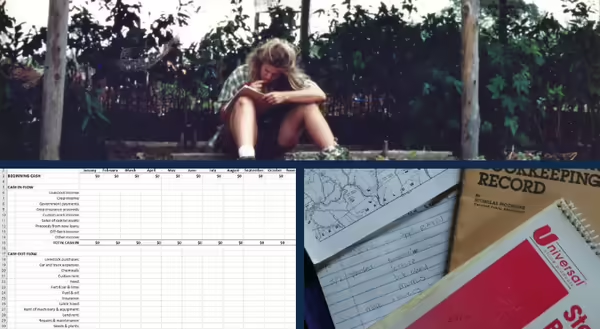
Living on the edge. Hustling. Working dawn to dusk, sunup to sundown, or 24-7. Nearly every farmer uses these words to describe their life. This endless work is not surprising given that farmers must be experts in growing crops, post-harvest handling, food safety, staff management, marketing, and selling plus have skills in tractor and small engine repair, contruction, basic plumbing, and electricity. Despite the hard work, many farmers straddle precariously on the edge of profitability, struggling to pay themselves and save for retirement. Many small farmers “solve” this problem by taking an off-farm job that pays health and retirement benefits so that they can continue to farm. In fact, no matter farm size, most farms have a source off-farm income.
In our culture, we believe that hard work is rewarded. If we are not rewarded, then all we need to do is work harder. Clearly most farmers work hard, yet most farmers are not rewarded with a return on their investment. All this effort and lack of profitability leads to stress and worry. Bankruptcy looms. Retirement is a dream. Our quality of life suffers. Relationships fall apart. And some businesses, like mine, dissolve.
In the mid-1990s, I had an organic vegetable farm. There I quickly learned to grow beautiful organic vegetables but struggled to earn a living wage. In the off-season, I worked as a substitute teacher and year-round in a restaurant. Just before I called it quits my plan was to take on more off-farm work as a ski instructor. I experimented with selling cut flowers because no one ever complained about the price. I sketched out plans to build a certified kitchen, so I could produce a value-added product. I explored selling in multiple sales outlets- farmers’ markets, restaurants, wholesale. Yet working harder only led to more work and more stress and more fights with my business-partner-boyfriend. It was time to make changes or give up. We decided to split.
This is not a new story, nor is it unique. If you’ve been working around farming for any time you know someone with a similar story. It could be you. Recently, a farmer told me at least four ways they could develop their business and was blaming themselves for being unable to decide which direction to take. Farmers— it’s not you. Nor is it your lack of business acumen or because you are indecisive. It’s about being confident in having enough information to make a good decision. One of the first things that slipped when I was farming was my record keeping. How many hours did I spend weeding carrots or mulching tomatoes? Sometimes I had no idea. My sales records were usually spot on, but often I neglected to record how much I did not sell as after market I had to rush off to wait tables. This oversight wasn’t because I was lazy. I was lacking a good system and a tool to help me stay organized. I was so involved in the present moment of setting up the physical farming system or managing the current crisis (like the time the well pump broke during the wash/pack process) that record keeping slipped to the bottom of the chore pile—at times forgotten, at others ignored. This lack of rigor lead to decisions based primarily on instinct rather than data.
Since leaving farming, I’ve continued to value “learning by doing” but I’ve also learned the importance of investing time in intentionally and systematically collecting and using information before acting. It requires patience, discipline, and systems. At times, I appear to move slowly, but when it comes time to choose a direction, the path is clear. Instinct is only used to break a tie or begin an investigation. While farm profitability is just one measure of farm success, without it, critical areas such as farmer work/life balance, physical health, ability to build community, and time and resources devoted to solving social problems suffer.
Recently, while preparing to teach Business Plan Basics in our Master Urban Farmer Training Program, I opened a box containing the remains of my farm records. My 23-year-old memory had been too harsh. I was pleasantly surprised to see we had been keeping records and developing systems and we had used these records to determine we had learned and earned all that we possibly could with our current approach to farming. The only way to change our situation was to make some major capital investments in the farm or to dissolve the business. Choosing to move on was not simply based on emotions and exhaustion, it was a logical decision backed by data.
Part of my work as Cook County Extension Educator, Local Food Systems and Small Farms, is to provide resources,education, and direct technical assistance to urban farmers. My work focuses on designing systems and empowering farmer’s to make strategic decisions to achieve their vision. If you’d like help conducting a systematic analyses; collecting data and keeping good records; completing a SWOT exercise or an asset map; or writing a business plan, a mission and vision statement, or a program logic model I’m not only here to assist, I love this work. My mission is to help all Cook County farmers and urban agriculture projects see their visions become reality and to move forward with no regrets.
* a version of this blog was published February 3, 2020 in Learn, Grow Food, Eat It, with the title Farming Life Lessons: A Stitch in Time Saves Nine.